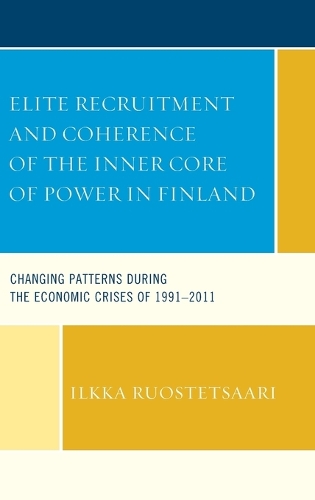
Elite Recruitment and Coherence of the Inner Core of Power in Finland: Changing Patterns during the Economic Crises of 1991-2011
(Hardback)
Publishing Details
Elite Recruitment and Coherence of the Inner Core of Power in Finland: Changing Patterns during the Economic Crises of 1991-2011
By (Author) Ilkka Ruostetsaari
Bloomsbury Publishing PLC
Lexington Books
1st July 2015
United States
Classifications
Professional and Scholarly
Non Fiction
Social mobility
Political economy
305.52094897
Physical Properties
Hardback
242
Width 162mm, Height 236mm, Spine 22mm
503g
Description
The book outlines the approaches of classical elite theory and democratic elitism for the study of national power structures. The book displays different research methods for elite study as well as the power conceptions included within these methods. An elite structure typology is derived from the elite theory and applied to chart the changes in the elite structure of one country, Finland. The data of this work is unique in international comparison: postal surveys were conducted among the elites and the citizenry in 1991, 2001, and 2011. The study explores empirically the changes occurring in the elite structure from the early 1990s to the present daya period that has been characterized by important societal upheavals, such as the great recession of the early 1990s, Finlands accession to the European Union in 1995, and the international financial crisis and the Eurozone debt crisis in the 2000s. The main focus is on how the elite structure has changed in terms of vertical social mobility (i.e., openness) on the one hand and horizontal mobility (i.e., coherence) on the other. With regard to vertical social mobility, the research interest focuses on changes in elites social background and various factors advancing their recruitment and career into elite positions. As for horizontal mobility, the study focuses on the elites different channels of contact with other influential groups in society, networking with various societal institutions, the attitudinal unanimity within various elites and between the elites and the citizenry, mobility between different elite groups (i.e. circulation), the accumulation of power positions, and the retention and loss of elite positions. The findings are compared with previous international studies, especially Scandinavian elite studies. Finally, the study considers what the results tell us about the state of democracy.
Reviews
Spanning 20 years, this is an exceptionally thorough study of how core elites and policies have evolved in Finland. A unique and an important contribution to the study of elites and politics. -- John Higley, University of Texas at Austin
Professor Ruostetsaari has been working on Finnish elites for decades. In this book, he gives a very comprehensive picture of the latter, including symbolic dimensions. I cannot imagine it being done better. -- Jean-Pascal Daloz
The study and research of elites is important. Lexington Books has recently published a volume by Professor Ilkka Ruostetsaari in the field. . . .One can only hope that there will be a renewed interest in the study of political elites after the publication of the valuable book on Finnish elites 1991 2011. * Varldsinbordeskriget *
Author Bio
Ilkka Ruostetsaari is Professor of Political Science at the University of Tampere.
